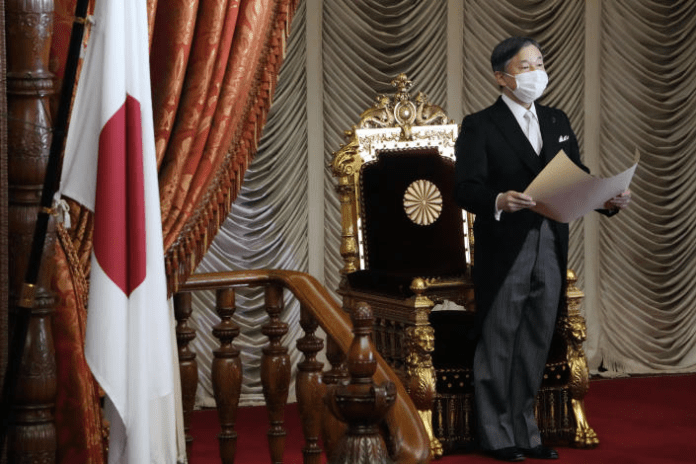| Translate This News In |
|---|
TOKYO — In his statement starting this year’s parliamentary session, Japan’s Prime Minister Fumio Kishida said combatting the epidemic was a “top priority” as the Tokyo region was struck by a surge in illnesses.
Hours after North Korea test-fired two potential ballistic missiles — its fourth this year — Kishida listed bolstering defence measures against escalating regional threats as a priority.
“I will devote my body and soul to winning this war against the coronavirus,” Kishida said in his address to the lower chamber, which kicked off a new 150-day session. He urged people to get together to overcome the pandemic’s “national crisis.”
On Sunday, 4,172 additional cases were registered in the Japanese capital, raising the hospital bed occupancy rate to 19.3 percent. Officials in Tokyo have stated that if the rate rises above 20%, they will ask the government to declare the area a pre-emergency and impose restrictions such as working from home and limiting restaurant hours.
Kishida reiterated his intention to maintain Japan’s strict border controls, which will prevent most foreigners from entering until the end of February, while the country works to speed up COVID-19 vaccine booster shots and strengthen medical systems to support an increasing number of patients being treated at home.
As more people are compelled to self-isolate as a result of the highly transmissible omicron variety, infections have risen and medical and public services have begun to stutter in certain places. The 14-day quarantine period was reduced to ten days last week in Japan.
Kishida urged businesses to encourage remote employment and schools to make flexible use of online classes. Booster injections were only started with medical personnel last month, and only about 1% of the public has received their third shot.
The time between a second and third vaccination for senior individuals in Japan was recently reduced from eight to six months. Most younger Japanese aren’t anticipated to receive their turn until March, partly due to a scarcity of imported immunizations.
North Korea’s repeated and growing missile tests “are simply not permitted,” Kishida said, adding that “we should not dismiss its tremendous advancement in missile technology.”
North Korea fired two potential ballistic missiles off the east coast of the country on Monday, according to Japanese officials.
North Korea’s nuclear and missile development, as well as China’s rapid military building, have already prompted Japan’s military budget to be increased by Kishida’s government.
Tokyo and Washington announced Monday that Kishida will attend an online summit with Vice President Joe Biden on January 21 in order to boost bilateral ties.
“The lynchpin of Japan’s diplomatic and security strategies,” said Kishida, referring to the US alliance.
Kishida, a native of Hiroshima, which was bombed with an atomic bomb by the United States during World War II, also stated that he wants to see “a world without nuclear weapons” and aims to convene a summit with former and current world leaders to discuss the issue. He expressed hope that the initiative’s inaugural gathering will take place this year in his hometown.
Kishida promised to push for energy changes in order to accomplish the goal of carbon neutrality by 2050. To achieve this goal, he said he supports the employment of “innovative” nuclear energy, nuclear fusion technology, and renewables.


















